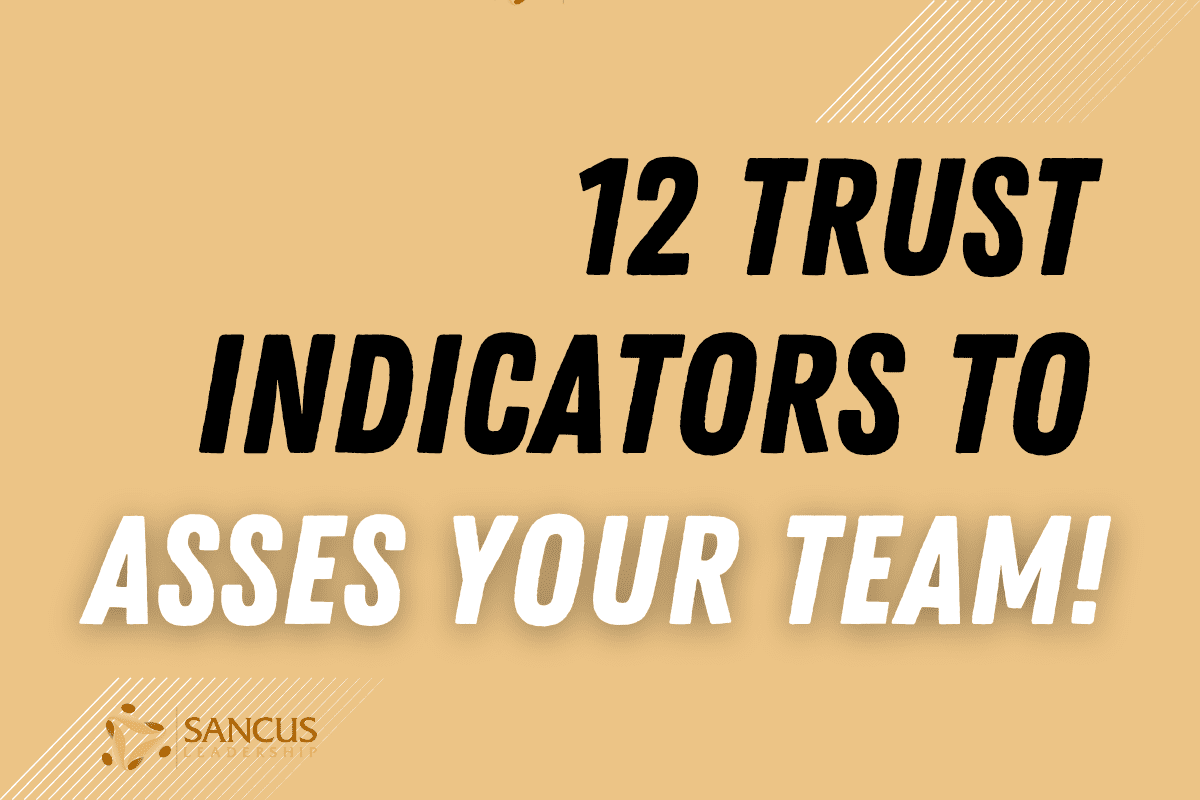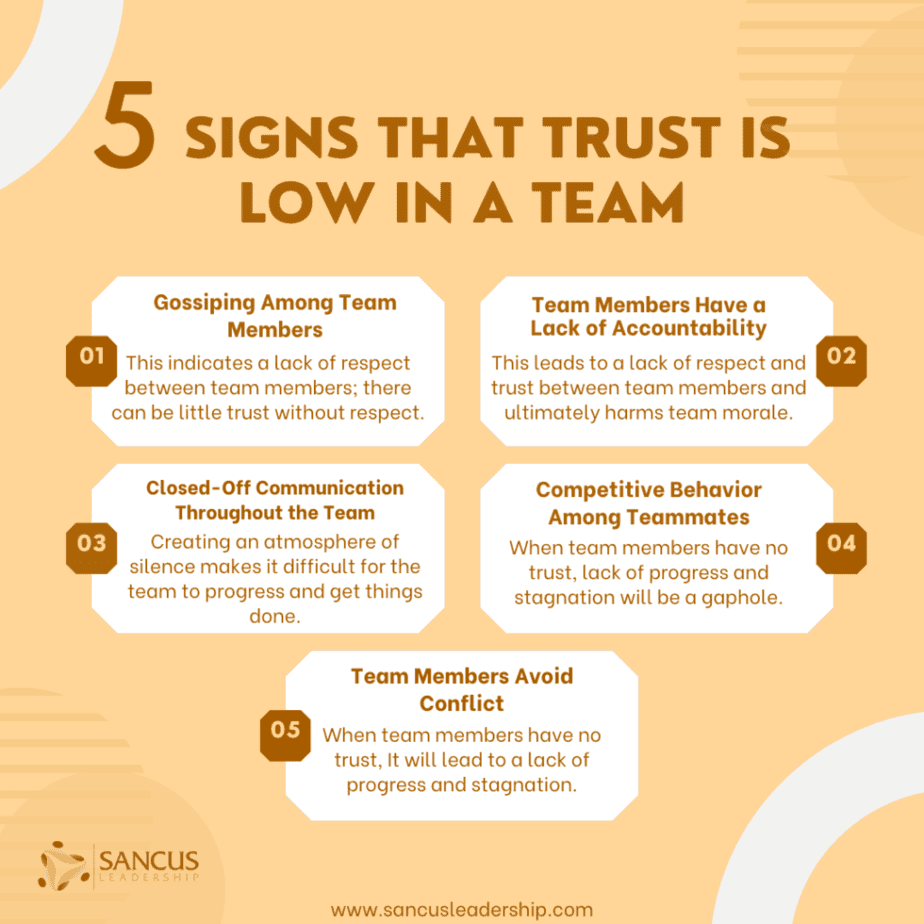Your cart is currently empty!

12 Indicators of Trust: Assess Your Team Now!
A team without trust is like a house built of paper bricks; everything will come down when the weather gets rough. When I consult teams, I often hear, “We are like a family; we trust each other,” but when I look at their behaviors, I see something different. This makes me think that many leaders need to understand what trust looks like.
There is open communication between team members when there is trust in a team. They feel comfortable expressing their opinions, discussing issues, and offering support to one another, creating an atmosphere of collaboration and trust that allows for better problem-solving.
Lack of trust manifests itself in various ways, and in teams lacking trust, people are often unwilling to take risks or challenge the status quo. Read on to know how you can identify whether or not your team has trust.
7 Signs That Trust Is High In a Team

Great things can happen when your team works together in a trusting environment. How can you tell if trust is high among team members? Here are five signs that demonstrate trust is high in the team:
1. The Team Has Open Communication
Open communication is the foundation of trust in any team. It sets a tone that it’s okay to be honest, vulnerable, and make mistakes. When team members feel comfortable speaking up, they can contribute their best ideas without fear of judgment or criticism.
Open communication builds relationships between team members, which is essential for trust.
You can gauge how open your climate is by noting down many different types of ideas that you are presented with. If all of the ideas shown to you are more or less the same as always, there might be an issue with open communication.
But if you are receiving plenty of wild ideas (you know, the ones that make you wonder if your employees have gone crazy). Then that’s a good sign that people are willing to risk looking like a fool to offer something new.
2. There Is Mutual Respect On the Team
The trust required to be successful in a team starts with mutual respect. Everyone must take responsibility for their actions but also have respect for the decisions and opinions of others.
The trust required to be successful in a team starts with mutual respect.
Team members should be open to different ways of approaching tasks and be willing to listen to the ideas of their peers, even if they disagree with them. Respect also goes a long way in building trust between team members, demonstrating that everyone is valued and heard.
If you’re building a diverse team, which you should, then this becomes even more important. When I say diverse, I mean people with different ideas and thoughts, not necessarily different appearances,
but great ideas are only helpful if the team can communicate them clearly and constructively.
3. Commitment To a Common Goal
Trust amongst team members is strengthened when everyone is committed to achieving the same goal.
When each team member agrees about the collective goal, it creates a feeling of shared purpose and belonging. This, in turn, leads to trust, as each member knows that the other team members will do their part in achieving that goal.
At Sancus Leadership, we take this a bit further and say without a goal, there is no team!
4. Everyone On the Team Has Honesty And Integrity
Honesty and integrity are vital ingredients to trust in any team. Honesty is about being truthful and open with each other, while integrity is about doing the right thing even when no one is watching.
Honesty and integrity are vital ingredients to trust in any team.
When team members have integrity, they can be trusted to do the right thing, even when no one else is around.
As you can understand, integrity deeply connects with understanding the business’s purpose and aim. People are much more likely to engage in something they understand and believe in wilfully.
5. The Team Members Are Supported and Encouraged
When team members show support and encouragement for each other, it creates a sense of trust.
Showing support can be as simple as offering encouragement or a listening ear when someone is having a tough day. Encouragement fosters trust within the team, demonstrating that team members care about each other’s success.
Encouragement fosters trust within the team, demonstrating that team members care about each other’s success.
Encouragement isn’t only about telling people they’re doing a good job. It is about making them feel important and that their contribution is helpful to the team.
Don’t use words such as “vital” or “we can’t continue without” you because deep within, we all know this is not true. Instead, be honest and talk about how much you appreciate this person.
6. People Acknowledge Their Mistakes
No one is perfect, and mistakes will happen, but building team trust means everyone is comfortable acknowledging mistakes and not fearing criticism.
Making mistakes should be seen as an opportunity for learning and growth, not a cause for shame. Of course, there are limits to which mistakes you can accept, especially if they are repeated mistakes with significant consequences.
Making mistakes should be seen as an opportunity for learning and growth, not a cause for shame.
But instead of getting angry or punishing someone for making a mistake, you can be understanding and open to constructive criticism.
Don’t make the error of thinking someone has bad intentions just because they screwed up, or as the old philosophers would tell it:
“Don’t assume malevolence where ignorance is sufficient.”
7. Everyone On the Team Celebrates Success
When team members celebrate each other’s successes, it shows that everyone is invested in each other’s success. This creates a positive atmosphere where each person is motivated to keep pushing forward.
Celebrating success together reinforces the bonds of trust within and between team members and their leaders. It also encourages growth and innovation, which leads to more success.
Make sure to make your workplace into a cheerleading convention; this doesn’t work in the long run. Instead, you want to encourage and celebrate success by giving precise and specific feedback.
Tell them exactly what you think they did great, how they did it, and how It impacted you as a leader; make it personal.
| Signs of High Trust in a Team | Explanation |
| 1. Open communication | When team members feel comfortable speaking up and contributing their ideas without fear of judgment or criticism, it builds relationships and is essential for trust. |
| 2. Mutual respect | Everyone must take responsibility for their actions and have respect for the decisions and opinions of others. Team members should be open to different ways of approaching tasks and be willing to listen to the ideas of their peers, even if they disagree with them. |
| 3. Commitment to a common goal | Trust is strengthened when everyone is committed to achieving the same goal, creating a feeling of shared purpose and belonging. |
| 4. Honesty and integrity | Honesty is about being truthful and open with each other, while integrity is about doing the right thing even when no one is watching. When team members have integrity, they can be trusted to do the right thing, even when no one else is around. |
| 5. Support and encouragement | Showing support and encouragement for each other fosters trust within the team, demonstrating that team members care about each other’s success. Encouragement is about making people feel important and that their contribution is helpful to the team. |
| 6. Acknowledgment of mistakes | Building team trust means everyone is comfortable acknowledging mistakes and not fearing criticism. Mistakes should be seen as an opportunity for learning and growth, not a cause for shame. |
| 7. Celebrating success | Celebrating each other’s successes shows that everyone is invested in each other’s success and creates a positive atmosphere where each person is motivated to keep pushing forward. Celebrating success together reinforces the bonds of trust within and between team members and their leaders. |
5 Signs That Trust Is Low in a Team

A team without trust will suffer from low morale and reduced performance. Here are five signs that might indicate a lack of trust in a team:
1. Gossiping Among Team Members
Gossiping among team members is a sign of distrust! It shows that individuals are not sharing information or ideas openly within the team but instead using gossip to spread rumors, idle speculation, and negative stories about other team members.
This indicates a lack of respect between team members; there can be little trust without respect.
This behavior will lead to a breakdown in trust within the team, causing members to become suspicious of each other, defensive, and even resentful.
It would be best if you destroyed gossip as soon as possible, and you need to do it in a way that doesn’t inhibit free speech and pushes you into the realm of autocratic leadership. If this is something you want to master so you can communicate better with your team, I invite you to reach out to me here and see how we can work together.
2. Team Members Have A Lack of Accountability
When trust is lacking in a team, members may be reluctant to take accountability for their actions, which can manifest in various ways, such as going back on commitments, blaming others for mistakes, or not taking ownership of projects.
This leads to a lack of respect and trust between team members and ultimately harms team morale.
SLE is a common problem on teams that have grown too big. You should figure out if this is a problem on your team by reading this article!
3. Closed-Off Communication Throughout the Team
Closed-off communication manifests when teammates need to offer their opinions, share insights when asked, or volunteer information without being prompted.
If a teammate feels that their opinions and thoughts won’t be respected, heard, or considered, they will likely not feel comfortable enough to speak up. Creating an atmosphere of silence makes it difficult for the team to progress and get things done.
4. Competitive Behavior Among Teammates
Competitive behavior can be a double-edged sword in the context of team trust.
On the one hand, a little healthy competition can fuel motivation and spark team members’ creativity. On the other hand, too much competitiveness can lead to criticism and resentment. If there is unhealthy competition among team members, it will be soon that trust starts to decline.
5. Team Members Avoid Conflict
Disagreements and debates are common in teams and necessary to ensure that ideas are thoroughly discussed and evaluated. When team members have no trust, such disputes may be avoided altogether, leading to a lack of progress and stagnation, as members are reluctant to speak up and share their ideas.

Final Thoughts
Trust is essential for teams to succeed in their goals, and by recognizing the signs of a lack of trust and making an effort to cultivate it, team leaders can ensure that their team is united, productive, and growing. Ultimately, this will lead to better results for the whole organization.
